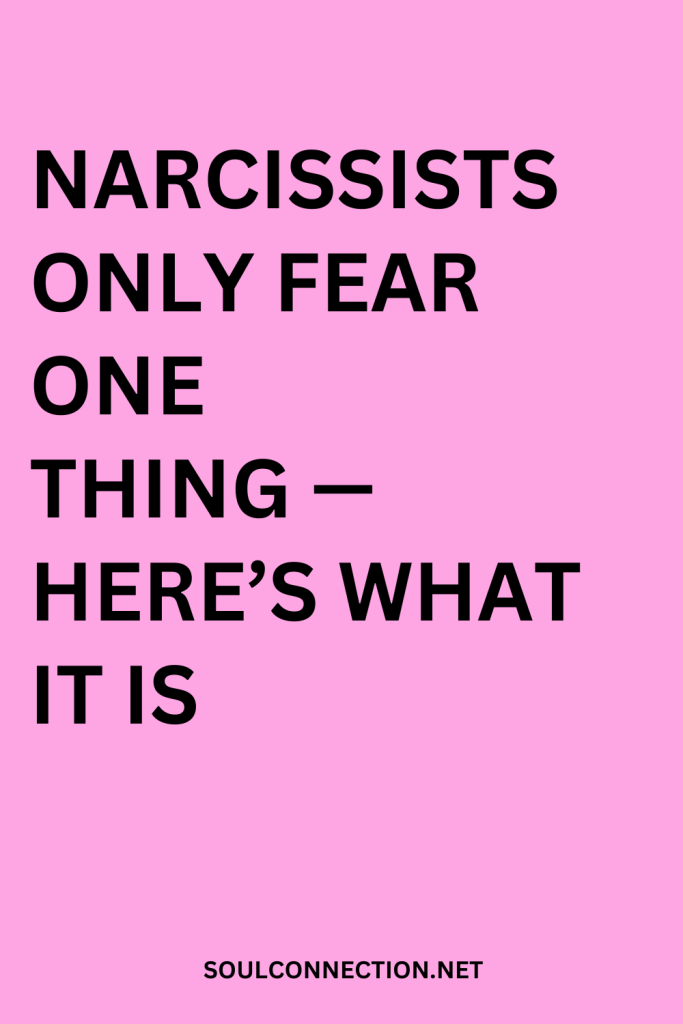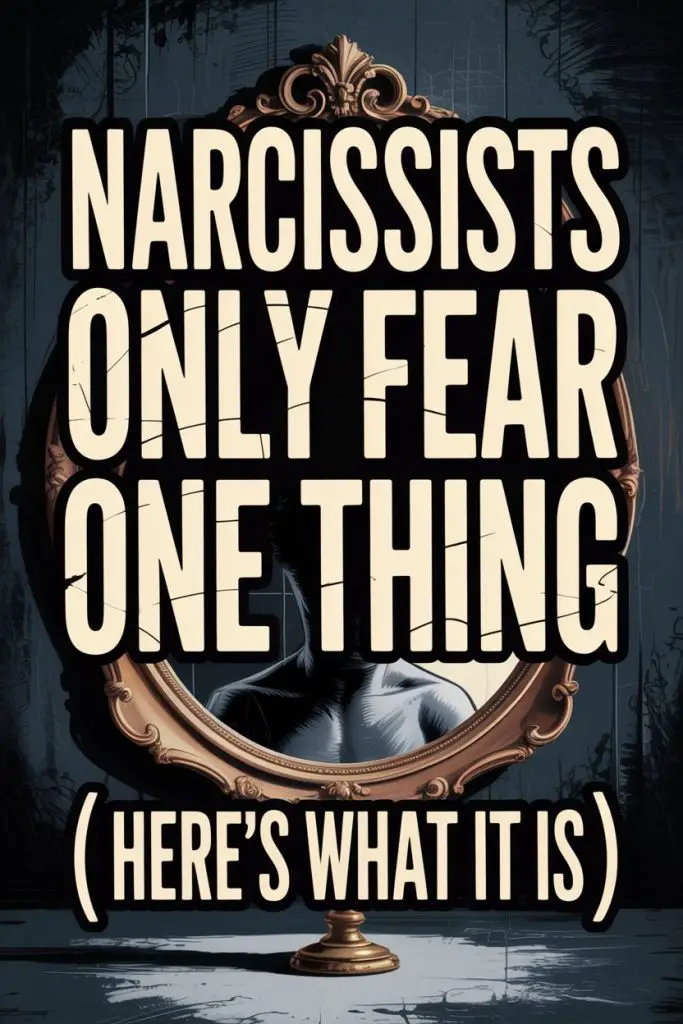Everyone, at some point, has encountered that one person whose ego could probably inflate a hot air balloon solo.
You know the type—charming on the surface, allergic to criticism, and somehow, every conversation circles back to their glory days (which, oddly, peaked this morning). These people don’t just love themselves—they practically build shrines.
But behind that marble statue of self-adoration sits a secret, trembling core. And yes, narcissists really do fear something. One thing, most of all.
Curious? Pull up a chair.
The Core Fear: Exposure of Their True Self
Underneath the bravado, narcissists possess a fragile sense of self-worth. Most people suspect narcissists are brimming with confidence, but it’s more like a thin candy shell over a hollow center.
Their biggest fear? Being exposed—having their true, insecure, deeply vulnerable self revealed to others.
It’s not criticism, not arguments, not even abandonment that truly keeps them up at night (though they hate those, too). It’s the horror of someone seeing past the act.
This isn’t just an “I-don’t-want-to-feel-awkward” type of discomfort. It’s existential.
The idea that someone could strip away their carefully curated image and reveal their flaws, insecurities, or failures is enough to send a narcissist into a tailspin. Even if they don’t admit it, even to themselves.
Why Exposure Matters So Much
Narcissists operate like master illusionists. They present an image: confident, capable, maybe even superhuman. But every magic trick requires you not to peek behind the curtain.
They build relationships, careers, and social circles around this persona. Anything threatening to reveal their vulnerability—a mistake at work, a partner calling them out, or a friend spotting the cracks—feels like an attack on their very survival.
To them, exposure equals annihilation. The shame is so overwhelming, it’s almost physical.
It’s the psychological equivalent of being caught with your pants down in Times Square. Not a good look.
How This Fear Shapes Their Behavior
Ever wonder why the narcissist in your life explodes over mild criticism or rewrites history to paint themselves as the hero? Now you know.
Their entire social strategy revolves around protecting their image. Gaslighting? That’s just tactical warfare—if you believe their version, the truth stays hidden.
Blame-shifting? Another classic. If it’s always someone else’s fault, they never have to examine their own flaws.
They also seek out people who reinforce their narrative and avoid (or punish) those who threaten it. Anyone who gets too close to the truth is labeled “toxic,” “jealous,” or “crazy.”
It’s easier to attack the messenger than to own up to reality.
Recognizing the Tells
Living or working with a narcissist can feel like navigating a minefield—never knowing what will set them off. These landmines are almost always linked to their core fear of exposure.
Notice how they react when confronted with evidence of a mistake: Denial, outrage, or a full-blown guilt trip, anyone?
Catch them in a lie, and you might find yourself suddenly responsible for World War III (or at least, the disintegration of their self-image).
Their defensiveness is less about the issue itself, more about the potential for their real self to be seen. The more you press, the more desperate their tactics become.
What This Means for Relationships
Being close to a narcissist is an emotional rollercoaster—peaks of love-bombing followed by plunges into blame, anger, or icy withdrawal. Their relationships are built on managing impressions, not genuine intimacy.
Vulnerability is a one-way street: you’re welcome to spill your secrets, fears, and hopes, but don’t expect the same in return. If you ask for emotional honesty or push for authentic connection, you’re inadvertently poking the bear.
This fear of exposure means they struggle with real intimacy. True connection requires showing up, flaws and all. Narcissists can’t risk it; the threat is simply too great.
How to Protect Your Sanity
Let’s face it: you can’t change a narcissist’s core fear. That wiring runs deep. But you can safeguard your own emotional well-being.
Set clear boundaries. Stick to your truth, even if they try to twist it. Refuse to play the impression management game—don’t cover for their missteps or become their unwitting PR intern.
When the blame-shifting or gaslighting starts, take a step back. Remind yourself that their meltdown isn’t about your actions; it’s about their terror of being seen as fallible. You’re not responsible for their self-esteem.
Seek support. Whether it’s a trusted friend, therapist, or online community, don’t isolate yourself. Gaslighting loses its power when you have reality checks from people who care about you.
If You’re Ready to Confront
Approaching a narcissist about their behavior requires nerves of steel and a healthy dose of realism. Expect defensiveness, denial, or even retaliation—remind yourself, you’re threatening their protective shield.
Instead of aiming for a tearful confession or epiphany, focus on protecting your boundaries. Use calm, clear language. Don’t get sucked into emotional theatrics or circular arguments.
Sometimes, the healthiest choice is to limit or end the relationship entirely. Narcissists rarely change unless they’re highly motivated (usually through a major loss or crisis). Your well-being deserves to take center stage.
For the Brave: What If You See Yourself Here?
Maybe you’re seeing some of your own patterns in these descriptions. Before you start spiraling, take a breath. A little self-focus or pride doesn’t make you a narcissist.
The difference is self-awareness. Narcissists run from examining their flaws. Growth-oriented folks—like you, if you’re still reading—know how to admit mistakes, feel remorse, and work on themselves.
If the idea of being truly seen terrifies you, that’s worth exploring—with compassion, not shame. Therapy isn’t a punishment; it’s a life upgrade.
The Power of Authenticity
Narcissists fear exposure because it threatens the one thing they value most: their image. Real connection isn’t possible without letting people see the messy, imperfect, glorious truth.
For those tangled up with a narcissist, honesty is your superpower. The more you embrace your own authenticity, the less sway their illusions will have over you.
There’s nothing scarier to a narcissist than someone who isn’t buying the act. Someone who sees the cracks, shrugs, and says, “I’m fine with real—are you?”
When the Mask Slips
Sooner or later, the mask comes off. Sometimes, it’s a dramatic reveal; other times, it’s just the slow drip of reality seeping in. The narcissist’s worst nightmare is here: someone sees who they really are and doesn’t flinch.
This isn’t your cue to become their mirror or therapist. Watching someone confront their greatest fear can be heartbreaking, infuriating, and oddly liberating. It’s not your job to fix them.
Your responsibility is to yourself—your peace of mind, your boundaries, your own glorious authenticity. That’s something even the most formidable narcissist can’t take away from you.
The Real Secret
Narcissists only fear one thing, and it’s the one thing they can’t ever outrun: being truly seen.
If you’ve tangled with one, you’ve already glimpsed the theatrics. Now you know the show’s real purpose.
You get to choose whether to stay in the audience—or step offstage entirely. And that, my friend, is a power worth holding onto.


